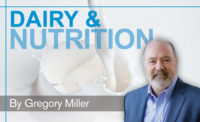Chocolate milk is nature's sports drink
The carbohydrates in chocolate milk provide usable energy and help to replenish glycogen stores.

Chocolate milk has been in the news recently — and part of that focus has been on its popularity as a recovery beverage for elite professional and endurance athletes. Chocolate milk is both affordable and well-liked. A growing body of scientific research has identified chocolate milk as an effective workout recovery solution — prompting athletes and those who advise athletes on nutrition to take notice.
This provides the dairy industry with a unique innovation opportunity. A better understanding of how chocolate milk helps the body rehydrate, refuel and rebuild after a workout has been a key research priority for the Dairy Research Institute, an organization established under the leadership of America’s dairy farmers through Dairy Management Inc. Recent studies on chocolate milk consumption by endurance athletes indicated that chocolate milk can help jump-start recovery after an intense training session, affirming chocolate milk as an effective post-workout beverage.
Putting muscle behind the matter
Exercise recovery and foods and beverages that can assist this process are important to endurance athletes because they routinely participate in multiple bouts of strenuous training within a day, with little recovery time between bouts.
To evaluate the impact of chocolate milk on subsequent aerobic performance, exercise scientists at the University of Texas at Austin had 10 cyclists perform three separate bouts of intense cycling in a laboratory setting designed to gauge physiological and performance responses. After each bout, the study participants consumed low-fat chocolate milk, a calorie- and fat-matched carbohydrate beverage, or non-caloric flavored water in a randomized fashion. After four hours of rest, participants completed a simulated 40-kilometer time trial. Performance time was fastest after participants consumed chocolate milk, beating both the carbohydrate and placebo beverages.
Similarly, researchers at the University of Connecticut conducted a study in which athletes ran on a treadmill at a fast pace for 45 minutes on two separate occasions. After one occasion, they consumed fat-free chocolate milk and after the other, they consumed a calorie-matched carbohydrate-only beverage. Following three hours of rest, the participants sprinted on the treadmill to exhaustion. After consuming the chocolate milk, the subsequent time to exhaustion for participants was 23% longer.
Nature’s sports drink
Years of sports nutrition research has identified three primary nutritional requirements for effective recovery after exercise. The first is rehydration. Replacing the fluids and minerals lost as a result of sweating during exercise is paramount to helping the cardiovascular and thermoregulatory systems respond appropriately to exercise. The second is carbohydrate energy. Carbohydrates help replace glycogen, the stored form of carbohydrate in muscles and the liver that is used up during exercise. Last, sufficient protein ingestion is needed to supply essential amino acids that support the accelerated rate of protein turnover that occurs in muscle in response to exercise. Protein ingestion helps exercised muscle repair and build its protein structure to adequately withstand subsequent bouts of exercise.
Milk provides fluid and minerals for rehydration, casein and whey proteins to support body protein synthesis, and a lower glycemic carbohydrate called lactose. Additionally, chocolate milk has added higher glycemic carbohydrates such as sucrose and/or glucose-fructose syrups. All carbohydrates in chocolate milk provide usable energy and help to replenish glycogen stores. Thus, chocolate milk contains the necessary nutritional components to support rehydration, protein synthesis and glycogen replacement, all of which must be activated for effective post-exercise recovery.
Milk also contains varying levels of fat, from 0.5% or less (skim milk) to not less than 3.25% (whole milk). Paradoxically, well-trained athletes have a high content of fat stored in muscle. This fat represents a reliable energy source for exercising muscle that, when depleted after long bouts of exercise, needs to be replenished to achieve full recovery. Dietary fat intake contributes to the replacement of intramuscular fat in athletes, and reduced fat or whole milk could be a contributor in this regard.
Moving from niche to mass market
Finding an effective recovery beverage is essential for many elite athletes to train and physically perform time and time again. Exercise-minded individuals also could benefit from this recovery nutrition. Chocolate milk’s ability to jump-start recovery after exercise provides a significant opportunity for communication to, and innovation for, these mainstream consumers. The dairy industry should more broadly share research-backed information that athletes and their advisers already know — chocolate milk is an excellent beverage for post-exercise recovery.
The combination of great taste, convenience and a strong nutrient package, on top of its ability to meet nutritional sports recommendations, make chocolate milk a top contender in the sports nutrition category. If positioned correctly, chocolate milk could be the answer to moving sports nutrition from a niche to mass-market opportunity. n
Looking for a reprint of this article?
From high-res PDFs to custom plaques, order your copy today!








